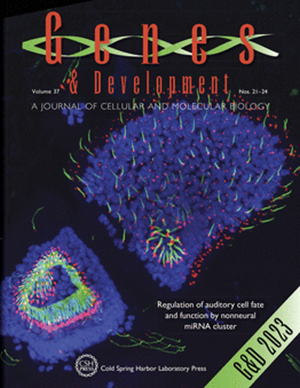Speed of life: tuning the ticktock of the segmentation clock
IF 7.7
1区 生物学
Q1 CELL BIOLOGY
引用次数: 0
Abstract
Although vertebrates share a similar body plan, different vertebrate species can develop at very different rates. In recent years, there has been an increasing appreciation of the fact that protein stability regulates the pace of differentiation. For example, global differences in protein stability may help explain why humans develop more slowly than mice. Mechanisms controlling the stability of particular proteins are also likely to play a role. In keeping with this idea, in this issue of Genes & Development, Meijer and colleagues (doi:10.1101/gad.352909.125) report that cells must keep tight control over the stability of the Notch1 intracellular domain (NICD) to tune developmental timing in the context of human somitogenesis.生活的速度:调整分割时钟的滴答声
尽管脊椎动物有着相似的身体结构,不同的脊椎动物物种可以以不同的速度发育。近年来,人们越来越认识到蛋白质的稳定性调节着分化的速度。例如,蛋白质稳定性的全球差异可能有助于解释为什么人类比老鼠发育得慢。控制特定蛋白质稳定性的机制也可能发挥作用。为了与这个观点保持一致,在这一期的《基因》杂志上;发展,Meijer和他的同事(doi:10.1101/gad.352909.125)报告说,在人类体细胞发生的背景下,细胞必须严格控制Notch1细胞内结构域(NICD)的稳定性,以调节发育时间。
本文章由计算机程序翻译,如有差异,请以英文原文为准。
求助全文
约1分钟内获得全文
求助全文
来源期刊

Genes & development
生物-发育生物学
CiteScore
17.50
自引率
1.90%
发文量
71
审稿时长
3-6 weeks
期刊介绍:
Genes & Development is a research journal published in association with The Genetics Society. It publishes high-quality research papers in the areas of molecular biology, molecular genetics, and related fields. The journal features various research formats including Research papers, short Research Communications, and Resource/Methodology papers.
Genes & Development has gained recognition and is considered as one of the Top Five Research Journals in the field of Molecular Biology and Genetics. It has an impressive Impact Factor of 12.89. The journal is ranked #2 among Developmental Biology research journals, #5 in Genetics and Heredity, and is among the Top 20 in Cell Biology (according to ISI Journal Citation Reports®, 2021).
 求助内容:
求助内容: 应助结果提醒方式:
应助结果提醒方式:


